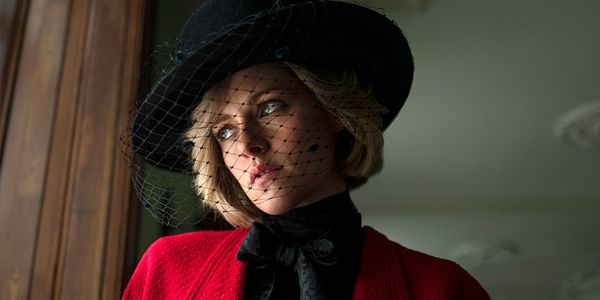TIFF 2021: SPENCER & THE EYES OF TAMMY FAYE

Wilson is a cinema enthusiast based out of Toronto, Canada.…
The following two films are dramatic interpretations of two very different people, but both highlight the power of cinema in bringing to life any lived reality in an artistic way. Pablo Larraín‘s Spencer takes a psychological approach in revealing the inner turmoils of Diana, Princess of Wales, with Kristen Stewart giving a transformational portrayal of a public figure that was first and foremost, a human being. While Michael Showalter‘s The Eyes of Tammy Faye is a somewhat traditional biopic (with comedic undertones) of televangelist Tammy Faye, who was marred in scandal thanks to her husband’s corruptive business practices. It features Jessica Chastain in a role that packs in all the punches from one of the industry’s most talented working actresses. Both films are unique in their own way, and this pairing certainly highlights two best actress front runners come awards season later this year.
Spencer (Pablo Larraín)

If Netflix’s The Crown has re-ignited the world’s interest in the British royal family, that interest certainly peaked with the introduction of Diana Spencer during the hit series’ fourth season. For all of its storied historical prestige, no other member of the royal family has garnered the level of beloved obsession as the Princess of Wales. And because of that, Pablo Larraín‘s Spencer comes with heavy expectations, which gets lifted off into space with an affecting character study that is truly magnetic. Those who might’ve doubted Kristen Stewart’s performative prowesses in tackling such a monumental role will be proven wrong within minutes of watching this beautiful film. The gravity of this thoughtful narrative will take some more time for me to fully digest, but this is easily one of my favourite films playing at the festival this year.
Set during the Christmas holiday season in the Sandringham estate in Norfolk, England, the film follows Diana (Stewart) and her tense interactions with the royal family as she ponders annulling her marriage with Prince Charles (Jack Farthing). This three day holiday period results in her constantly budding heads with Major Alistar Gregory (Timothy Spall), who seems to watch her every move at the request of her royal majesty, the Queen (Stella Gonet). She finds solace in familiar faces, including her personal dresser Maggie (Sally Hawkins), chef Darren (Sean Harris), and of course, her two lovely children, Princes William (Jack Nielen) and Harry (Freddie Spry).
Knowing full well that Spencer is only a dramatic interpretation of Diana’s inner psychological turmoil, Larraín opens up the film with the following title on screen: “A fable from a true tragedy”. And what follows is a series of beautifully crafted sequences that possess a dream-like quality to them, which angles itself toward a truthful representation, without ever claiming to be completely factual. The film takes creative license in forming an emotional exploration of Diana Spencer, as opposed to a narrative exhibit that can be detailed within a chapter of a history book. And Larraín does this by carefully framing each scene with exquisite care, creating a portrait-like cinematic experience that does indeed feel like a fable. The use of symmetry by cinematographer Claire Mathon only complements the surface appearance of perfection inhabited by Diana’s public persona, which breaks apart as her personal trials are brought to life. Jonny Greenwood‘s score is beyond mesmerizing, which carries the film across variable terrains with ease. The soothing motif is interspersed with jazz-like transitions at times, which punctuates the film’s interpretative dogma. Mathon also has Petite Maman screening at the festival this year, while Greenwood has The Power of the Dog, making 2021 one of the most accomplished years for both these masterclass individuals (although Mathon has already experienced a similar year in 2019 with both Atlantics and Portrait of a Lady on Fire).
And one can’t talk about Spencer without praising Stewart’s performance, which deserves all the buzz currently going around town. Even though the film itself is perfectly crafted in so many other ways, Stewart sticks out as a crown jewel who simply carries each frame on her shoulders without ever missing a step. She channels a transformative energy that really goes beyond the usual portrayals of real-life figures, transcending our collective memories of who Diana actually was as a person. The interactions between Diana and Princes William and Harry are tenderly portrayed, providing a glimpse of the heartfelt sense of motherhood we have always associated with her, but rarely seen depicted. And this level of praise isn’t meant to throw shade at Emma Corrin, who does an excellent job in The Crown. Spencer as a piece of narrative art is just at a whole different level of interpretive storytelling, and almost requires a reset of expectations that draws on fact to create a unique version of fiction. Stewart is able to do this in what is certainly a career-best performance for an actress that has always been abundantly talented but often overlooked due to her roots as a highly commercialized figure in popular culture.
Many will be quick to compare Spencer with Jackie, which is a fair comparison, albeit one that carries little weight to it. Larraín might have chosen to highlight a high-profile historical female figure in both these films, but each stands on its own as unique entities. Spencer, in my opinion, is one of Larraín‘s most accomplished films to date and speaks volumes to his mastery of the cinematic language. Together with Stewart’s breathtaking performance, this is a film that truly demonstrates how cinema can elevate any story, no matter how familiar, in ways that no other artistic medium can.
The Eyes of Tammy Faye (Michael Showalter)

Whether you like the film or not, everyone will agree that Jessica Chastain is set for a busy awards season this year with her electrifying performance in The Eyes of Tammy Faye. Directed by Michael Showalter, this is a biopic that collides perfectly with his comedic tendencies, which hopes to revitalize the life story of this larger-than-life evangelist who came to fame in the 1970s/80s. The film is thoroughly entertaining to watch but doesn’t necessarily serve as an objective indictment of Tammy Faye’s actions in her monetization of religion. The 2000 documentary of the same name – of which this film was based – is perhaps a better example of that. But as with any piece of narrative storytelling, creative licenses are expected, and often help elevate the emotional impact of its source material. And to that effect, the film is an engaging and fun piece of biographical storytelling that isn’t void of bias and flaws but thoroughly entertaining nonetheless.
Spanning a number of decades starting from the 1960s, the film follows the rise and fall of Tammy Faye (Chastain) and her (then) husband Jim Bakker (Andrew Garfield) as they created one of the largest religious television networks in the world. Tracking their humble roots of falling in love as young adults, the film ultimately focuses on their creation of The PTL Club television show that resulted in their dominance as evangelical powerhouses during the 1970s and 80s. Raking in millions from viewer pledges, the television empire they created was eventually destroyed when Bakker was charged with fraudulent practices. Faye’s involvement as an advocate for the LGBTQ community at a time when it was even more taboo for religious groups to do so is also highlighted in the film. Cherry Jones also co-stars as Faye’s evangelical mother, while Vincent D’Onofrio plays rivalling televangelist Jerry Falwell, with additional appearances by Fredric Lehne, Louis Cancelmi, Sam Jaeger, and Mark Wystrach.
A film like The Eyes of Tammy Faye is a stark reminder of why biopics exist in the first place, with its ability to illustrate an event or life story in a way that simply isn’t possible through documentary filmmaking. Whereas a documentary of the same name has already existed since 2000 and does an excellent job at recounting the lived experience of Faye during her most tumultuous years, this current film version of those events actually personifies that actual experience itself. No event is experienced without bias and emotion, and with narrative filmmaking, that subjective nomenclature that inhabits all our experiences in life becomes possible. With The Eyes of Tammy Faye, the calamity of Faye and Bakker’s humble beginnings are firmly established, before entering the roller coaster thrill ride of both success and failure during their evangelical dominance. Showalter leans heavily on his comedic bearings as a director, and appropriately sets the film through the perspective of Faye’s overly upbeat personality. By doing this, the comical approach of the film feels more sensible, and as further commentary, might have been a part of Faye’s coping mechanisms as she traversed her crisis in both identity and faith.
Despite having the license to be bias and subjective, which is the right of any narrative filmmaking endeavour, the film does gloss over Faye’s knowing involvement in shamelessly commercializing religion. She’s not necessarily painted as a saint, but the film does perhaps lean a bit too far into this stratosphere of biographical interpretation. And if it weren’t for Chastain’s mesmerizing performance, this deficiency might be more of a problem. But she simply anchors the film from the very beginning, making it hard to look away and not be fully immersed in her personification of this imperfect human being. It’s tough to say that this is Chastain’s best performance, only because she’s been bewilderingly amazing in so many different roles over the years. But given the nature of this particular portrayal, she may finally land an Oscar win that will eventually befall her at some point in her career, if not this year. Garfield is also exceptional as Chastain‘s evangelical counterpart, and although his performance might be overshadowed by hers, he’ll likely earn some accolades himself.
The Eyes of Tammy Faye is a surprisingly touching biopic that is a hoot to experience thanks to a comedic interpretation that is bolstered by one of the strongest performances of the year. The film has a commercial beat to it, but this works well within the highly commercialized televangelist world that it is trying to depict. For those who aren’t familiar with Faye as a once relevant figure in American popular culture (myself included), the film is an eye-opening experience that is both immersive and a joy to watch. It might just require a bit of blind faith to accept the depiction of who Faye really was as a person, which isn’t a hard task when you have Chastain batting for the fences.
The Eyes of Tammy Faye and Spencer premiered at Toronto International Film Festival.
Does content like this matter to you?
Become a Member and support film journalism. Unlock access to all of Film Inquiry`s great articles. Join a community of like-minded readers who are passionate about cinema - get access to our private members Network, give back to independent filmmakers, and more.
Wilson is a cinema enthusiast based out of Toronto, Canada. He escapes from his day job by writing random thoughts about cinema on the internet. Although he has a longstanding penchant for Hong Kong cinema, he considers himself to be an advocate for Asian cinema in general. He has been attending the Toronto International Film Festival every year since 2005, and more of his work can be found on his website: www.wilson-kwong.com.













